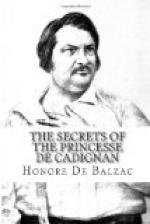To the noble simplicity which characterized his head, d’Arthez added a naive expression, the naturalness of a child, and a touching kindliness. He did not have that politeness tinged with insincerity with which, in society, the best-bred persons and the most amiable assume qualities in which they are often lacking, leaving those they have thus duped wounded and distressed. He might, indeed, fail to observe certain rules of social life, owing to his isolated mode of living; but he never shocked the sensibilities, and therefore this perfume of savagery made the peculiar affability of a man of great talent the more agreeable; such men know how to leave their superiority in their studies, and come down to the social level, lending their backs, like Henry IV., to the children’s leap-frog, and their minds to fools.
If d’Arthez did not brace himself against the spell which the princess had cast about him, neither did she herself argue the matter in her own mind, on returning home. It was settled for her. She loved with all her knowledge and all her ignorance. If she questioned herself at all, it was to ask whether she deserved so great a happiness, and what she had done that Heaven should send her such an angel. She wanted to be worthy of that love, to perpetuate it, to make it her own forever, and to gently end her career of frivolity in the paradise she now foresaw. As for coquetting, quibbling, resisting, she never once thought of it. She was thinking of something very different!—of the grandeur of men of genius, and the certainty which her heart divined that they would never subject the woman they chose to ordinary laws.




